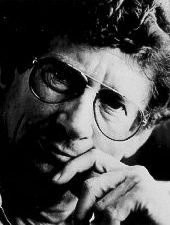
JOHANNESBURG - André Brink was born in Vrede (Peace) in the Orange Free State in late colonial South Africa, into an Afrikaner family, and pursued the routes and ways of his times, reaching adulthood just as the country passed out of the arena of the crumbling British Empire into the hands of the white supremacist, Afrikaner Christian nationalist apartheid regime.
Nothing in his early history indicated any signs of the radical shift he would undergo later. His school and university education happened inside the establishment institutions building A post-1910 Afrikaner nationalist identity, including the schools and university he attended and the subject matter he chose to do graduate studies on.
As he often indicated in his long, productive life, the shift in consciousness, the great disillusion which lead to the greater awakening of his conscience, happened in the wake of a visit to France.
While there, the 1960 police massacre at Sharpeville catapulted South Africa into the headlines. Against the backdrop of this and other events, Brink’s interest in the culture of letters and his new reading of the political canvas of his home country facilitated a shift in his intellectual material.
The accident and horror of history turned the teacher of Afrikaans and Dutch language and literary studies at a marginal, insignificant university in the Eastern Cape, into a dissident thinker and writer in the language the apartheid state and its institutions wished to appropriate as the language of mastery and white supremacy.
As one of ‘the Sestigers’ (writers and artists of the 1960s who were increasingly disillusioned with the parochial, anti-intellectual cultural cringe of mainstream Afrikaans literary and artistic endeavours which were complicit with the Christian nationalist project of the Afrikaner institutions buttressing the apartheid state), Brink’s early work in Afrikaans set him apart. The early plays, and the novel “Die Ambassadeur” (“The Ambassador”) demonstrated his talent, and his wish to re-place Afrikaans writing in relation to developments in post-1945 European writing.
In the 1970s he began to publish in English as well, translating his own work, and broadening his audience from inside the isolationist and isolated apartheid state dominated by anti-intellectual Afrikaner fascism – the years of Swart and Verwoerd behind, the years of Vorster and Botha ahead – and the hardening of conservative attitudes as the apartheid state began fighting its neo-colonial wars on the subcontinent. These were the years of the apartheid state’s military adventures in Angola and Mozambique, cooperation with the failing white supremacist regime of Ian Smith in Rhodesia (now Zimbabwe), and the wholescale militarisation of white South African life.
From this era, Brink’s engagement with demystifying the ‘race’ and racist myths of establishment Afrikanerdom led him to write such novels of South Africa’s slave history as “An Instant in the Wind” (“’n Oomblik in die Wind” - 1975) and “A Chain of Voices” (“Houd-den-Bek” – 1982).
He also used the trope of ‘miscegenation’, sex across racial barriers, a foundational component of apartheid legislation, but also of the white supremacist mythography which Afrikaner identity depended on, throughout much of his work.
But it was the Soweto student uprisings of 1976 and the death in detention of Steven Bantu Biko in 1977 which spurred Brink’s masterpiece, “A Dry White Season” (“’n Droë Wit Seisoen” – 1979). The book, which takes its title from a poem by Mongane Serote, examines the difficult issues of complicity and implication of white South Africans of conscience in the exigencies of the system from which they benefited despite their disillusionment. The radicalisation of Brink matches that of his peers, Nadine Gordimer and JM Coetzee, who took different routes through their engagement with the problematics of the conscientised white subject in a white supremacist society. This shift echoed the radicalisation of Black writers in apartheid’s decade of ‘Gotterdamerung’, the apocalyptic 1980s of PW Botha’s states of emergency. Brink’s work from this decade include “States of Emergency” (1988) and “An Act of Terror” (“Die Kreef Raak Gewoond Daaraan” - 1991), and show the novelist engaging with the troubling relationship between art and politics far more directly.
After a three-decades-long career of teaching Afrikaans and Dutch literature at a university in the Eastern Cape, Brink joined JM Coetzee in the Department of English Language and Literature at the University of Cape Town in 1990 as a full professor. He continued his work as novelist and critic, and taught across the curriculum at both undergraduate and post-graduate studies. In this role he will be best remembered as a fine teacher, a compelling lecturer, and a gifted and uncannily generous graduate supervisor. He retired from that position in 2005. His memoir, “A Fork in the Road” (2009), traces his long life and its details across three different incarnations of South Africa for those who are interested, from his birth in a British colony, to his old age in post-apartheid democracy.
For those who benefited from reading his impressive oeuvre, Brink’s passing also marks the passing of an era in South African literary culture. His curious mind gave us not only a large selection of accomplished novels, but books of criticism as well. Many will remember his spirit of humility and willingness to engage across a variety of platforms and spaces, and with a wide range of people. Some of us were lucky to have been taught (and in some very important senses, retaught) to read and re-read critically: we owe him much in our intellectual lives as thinkers.
His family has lost a husband, father and grandfather; South Africa says farewell to one of its most talented dissident storytellers.
Hamba kahle.
- eNCA
 SLiPStellenbosch Literary Project
SLiPStellenbosch Literary Project 